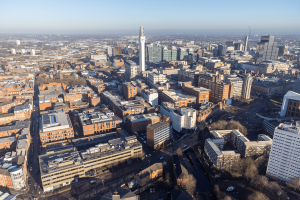An economy moving in the right direction, with an honest appraisal of challenges
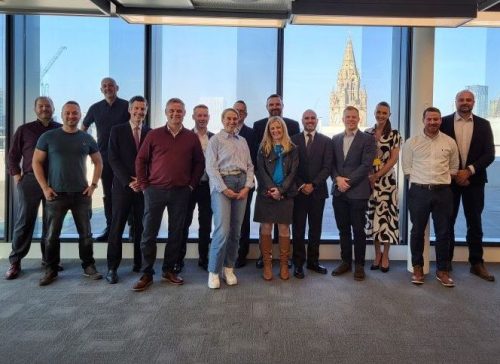
 Peter Arnold, EY’s Chief Economist, provided an optimistic outlook on Manchester’s economic performance to open our round table discussion on regional growth, as part of a series of events around the country aimed at testing the economic pulse.
Peter Arnold, EY’s Chief Economist, provided an optimistic outlook on Manchester’s economic performance to open our round table discussion on regional growth, as part of a series of events around the country aimed at testing the economic pulse.
He noted that it “outstrips any other city in the UK in terms of growth.” He also highlighted the region’s success in developing a “high tech, digital, high value add services sector” as a key driver of this growth. However, Peter also acknowledged the “key challenge” of diffusing Manchester’s success across the broader North West region, which he said “still lags the continued powerhouses of the UK economy.”
Discussing the national economic picture, he noted that while the UK economy dipped into a “mild” recession at the end of last year, it has “bounced back quite quickly.” He attributed this to a combination of lower inflation and interest rates, which have “taken pressure off households” and businesses. He also highlighted the potential for the UK to “reset international perceptions” as a politically stable and pragmatic economy, in contrast to the instability seen in Europe and the US.
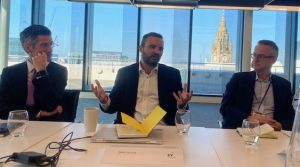
Peter Arnold
It provided the participants in the room with much to discuss, and notable amongst their common concerns appeared to be labour market challenges.
Participants shared insights on how they are facing those challenges. Fran Reed from NRG Riverside discussed the difficulties of attracting tech talent to areas outside the city centre, noting that “finding people in that area who can deliver that for us is a real, real challenge.”
Marc Holding from the Vella Group echoed this, explaining that his company had to “move to” Manchester to access the necessary talent, as “you can’t bring them to you.”
Tom Kearsley from Glencar Construction highlighted the impact of Brexit on their ability to find skilled labour, stating that “we’ve lost a lot of talent due to Brexit, people just left and went back to Poland it was a massive loss, really.” He also noted the challenge of attracting workers to the construction industry, with people “not wanting to go and do it now” for the same rates as before.
Michael Howard at Urban Bubble explained how his business manages large scale apartment buildings, which because of the foreign investment boom has seen his team managing 1000 plus home communities, more like a hotel General Manager.
“Brexit killed us a little bit because the labour force that was doing those on site facilities, jobs like cleaning, maintenance, caretaking, front of house just disappeared. We then had this bounce back when the hospitality people working on airlines and hotels came to us and an all left when we opened back up again. And I think if I could switch off LinkedIn we’d be okay.”
He said his main challenge was to establish the business as an “employer of choice” in a rapidly changing world where workplace dynamics have changed a great deal.
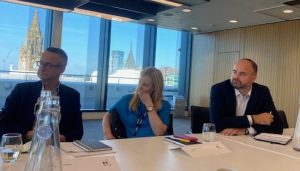
Caroline Grant (left, centre), from the consulting firm Slalom, provided an interesting perspective on the labour market challenges and trends she has observed. She noted that in the digital and business advisory sectors that Slalom operates in, there has been less of the high churn that was seen in previous years.
However, she has noticed an influx of experienced talent seeking leadership roles in the Manchester region, rather than moving to London. As she explained, “what I find interesting is actually where I feel like I’ve been inundated with people asking to kind of join our company or exploring roles within our company. It tends to be at the leadership level, where there’s been organisational change in other consulting companies, where they’ve gone for a global operating model or a UK operating model, and away from a regional model.”
Caroline suggested this could be reflective of a shift in priorities for more experienced professionals, who may be looking to stay in the region and take on leadership roles, rather than moving to the capital. As she put it, “I’ve seen a bit of the opposite in people wanting to make a difference within Manchester, stay in and be part of an organisation that that really enhances that and enables them to do that.”
This observation provides an interesting counterpoint to the broader concerns around brain drain and the ability to retain talent in the North West. Caroline’s comments suggest that at the more senior levels, there may be an increasing desire to build careers and make an impact within the Manchester ecosystem, rather than gravitating solely towards London. This could be an important dynamic to monitor as the region continues to develop its economic and talent base.
Participants also shared insights on how these labour challenges affected infrastructure and supply chain issues. Rick Byers from Freedom Fibre, which is developing fibre network around the country, discussed the difficulties of attracting and retaining talent in the telecoms sector, though noted that “everything’s basically been hand built” and that the company has to “deal a lot more dynamic with how we operate a business” to attract and retain workers across a wide range of service lines.
Similarly, Ben Grunfeld, strategy and growth director at Electricity Northwest talked about the impact of supply chain and labour market pressures on his business, stating that “supply chain, both from a materials and plant perspective, as well as a human resource perspective, is certainly a growing challenge.” He also highlighted the need for better infrastructure to support the region’s growth, noting that “the reality is still a very significant gap” compared to London and the South East.
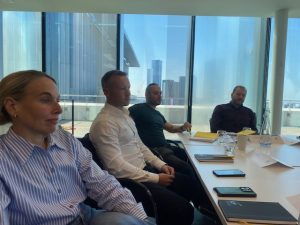
One of those increasing demands on the grid will come from wider use of electric vehicles, which Alison Ross from Autotrader discussed in the context of a shift to electric vehicles on consumer behaviour, noting that in reality, right now, “consumers are really quite confused about what they should do, and that is definitely affecting how people think about the cycle of what they’re doing, purchasing their new car.”
Returning to Peter Arnold’s opening remarks on spreading the success of Manchester across the rest of the North West Ben Grunfeld discussed the competition between northern cities, stating that “there is that competition for talent. There is that competition for competition for investment between the northern cities, which are servicing a population that is a still fraction of the size and an economy that is a fraction of the size of London in the South East.”
One of the challenges highlighted by Dave Parsons from Zuto was that his business moved into the city, at a higher rental cost, from Macclesfield, because that need to specifically attract tech talent outweighed cost considerations – “it was initially set up for that, but we’ve been scaling and scaling that operation now. So now the bulk of the contact centre is now based out of Manchester as well.”
Dave highlighted that this move to expand in Manchester, despite the associated costs, has been “well worth the outlay” from an employer branding and talent retention perspective. However, he also acknowledged the challenge of competing for tech talent, particularly with the rise of remote work enabling developers to work for companies based in London while still living in the North West.
The crunch issue seems to be Manchester’s transition to being a serious global city, with all the elements that such a definition demands.
David Hilton from the inward investment agency MIDAS explained how the city is still good at retaining graduates, but the change in the last kind of 15 to 20 years that has made Manchester a globally attractive city has been huge.
“A big part of choosing a new location is not just about, is there a market for me there and but is it a good place to live? Manchester does really have that brand now that is proving attractive. Coupled obviously with the International Airport you’ve got that connectivity to make it a lot easier for global companies to consider it as a hub in the UK and hopefully in Europe.”
On the subject of Manchester’s own brand, Sophia Szlachetko from EY highlighted the broad spectrum of labour market challenges she has seen across different sectors and the need for better quality and availability of labour, but saw the challenges across the board. “No matter what sector you’re in, whether it’s top end professional, or the lowest skills, it’s still the main consistent challenge.”
She also made the point that the presence of a home grown private equity community, capable of raising capital for ambitious businesses was a huge plus for the city.
Her colleague Tehseen Ali from EY also highlighted the influx of international talent into the region and the changing dynamics of the workforce, with a focus on office culture and productivity, a real sign of maturity.
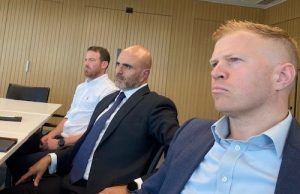 Rhys Walley from Manchester Airports Group explained some of the grand plans underway to modernise the airport, but also emphasised the importance of infrastructure, pointing out that getting around regions like the Netherlands or the Raanstad is far easier, stating that “investment in infrastructure is going to be key to unlocking that growth potential, and we’re able to build that into our models.”
Rhys Walley from Manchester Airports Group explained some of the grand plans underway to modernise the airport, but also emphasised the importance of infrastructure, pointing out that getting around regions like the Netherlands or the Raanstad is far easier, stating that “investment in infrastructure is going to be key to unlocking that growth potential, and we’re able to build that into our models.”
To that point others pointed out that the rail and tram network, while a work in progress, isn’t there yet. “People don’t want to come into the city because it’s so difficult,” said one.
A warning against complacency, maybe?


